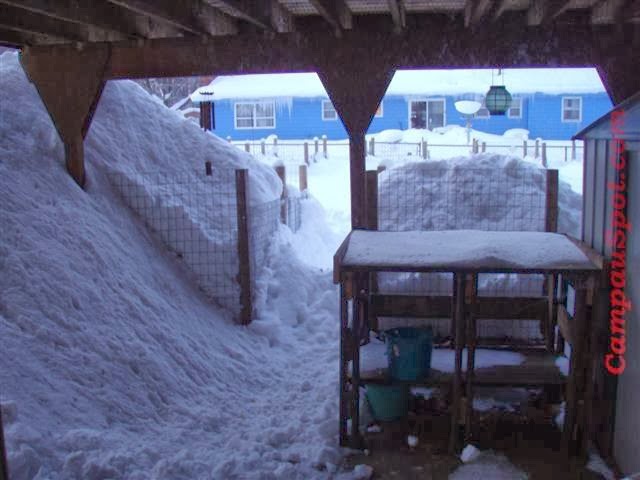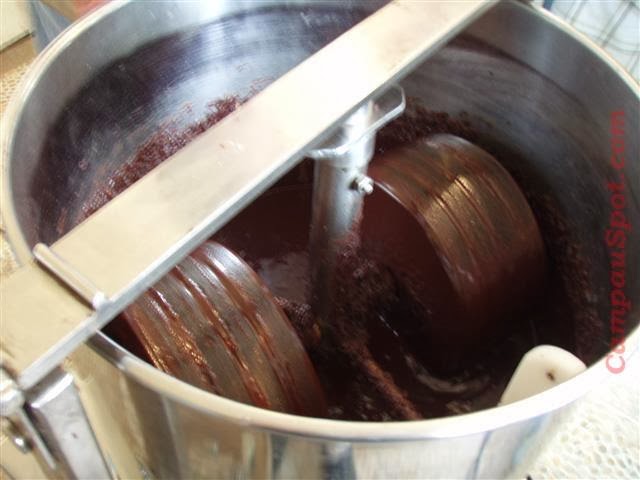We had the opportunity to go to Costa Rica as part of a teen
leadership camp in mid-February. We left
behind more than 10’ of fallen snow and subzero temperatures.
.jpg) |
| Will all this snow ever melt? |
.jpg) |
| Airplane view of Costa Rica |
We landed in San Jose on the western side of the mountain
range which runs down the middle of Costa Rica.
The western side is more arid because it is in the rain shadow of the
mountains. We headed over the mountain
range to the lush Caribbean side and made our way to the Bocuare Jungle Camp.
.jpg) |
| Over the mountain and through the woods, I mean jungle... |
.jpg) |
| View from our cabin. |
.jpg) |
| Bocuare Jungle Outdoor Kitchen, no electricity required. |
.jpg) |
| S. Crossing the dangerous swamp... Look, strong bridge! |
One of our expeditions took us on the Caribean Chocolate
Tour. Paul, the owner explained his goal
to grow cacao sustainably and organically in a permaculture setting. Paul showed us how he processes his organic
cacao seeds by fermenting and sun-drying them which preserves the healthful
properties including the antioxidants in the finished chocolate. The more
common chocolate found in candy bars does not have these properties because of
the chemical manufacturing process called “Dutch Processed”. We sampled several varieties of the fine
chocolate bars on the tour and found them to be unique, rich, and satisfying.
.jpg) |
| Permaculture cocao jungle at Caribeans. |
.jpg) |
| Another picture at Caribeans. |
.jpg) |
| Cocao press... thick, rich, and chocolaty. |
.jpg) |
| Removing cocao beans from the pod. |
.jpg) |
| Scenic view of the Caribbean ocean. |
.jpg) |
| View from our cabin. |
The road to Bocuare went through a bamboo forest that we were
told was planted by the banana companies.
The bamboo was intended to be used as supports for the banana plants but
was abandoned for another support system.
The highly invasive bamboo is changing the local eco system.
.jpg) |
| Bamboo forest. |
There are two main fruit companies in Central America called
Standard Fruit Company and United Fruit Company. From what we were told by people who live in
the area, these companies’ practices are focused on profits over the good of the
local people and environment. We heard a
crop duster plane flying overhead nearly every morning. The people who lived nearby often get sprayed
during their commute on foot to work and school as they have to use the roads
that run through the banana plantation. We have decided to boycott these companies
because of their practices and purchase organic bananas.
.jpg) |
| Passing through a banana plantation. |
.jpg) |
| Warning: danger of hazardous spraying... |
The sponsor of the camp took everyone to his property where
he has 3 acres of edible jungle. He
interplanted bananas, coconuts, pepitas, lemons, limes, sugarcane, mangos,
papaya and several other varieties of trees.
He hoped that the permaculture aspects of the orchard would create a
beneficial habitat. We did see a large
number of spiders and bugs that you wouldn’t find in a commercial monoculture
orchard.
.jpg) |
| Living tree fence. |
.jpg) |
| View from top of mountain. |
.jpg) |
| Banana tree. |
.jpg) |
| Pineapple plant near the house. |
His neighbor is a local missionary who has started food
gardening in his yard. Most Costa Ricans
do not grow personal food gardens and even believe that it is impossible. We were told the supposed reason why was that
they lost the knowledge when Europeans changed their culture.
.jpg) |
| Tomato plants. |
.jpg) |
| Other various raised beds with hoops. |
Pictures from a walk we took at Bocuare.
.jpg) |
| Jungle walk. |
.jpg) |
| Swamp land, look out for the crocs! |
.jpg) |
| Beautiful Aloe plant. |
.jpg) |
| T's favorite pic, dubbed the "fiber optic flower". |
.jpg) |
| More Bocuare Jungle |
.jpg) |
| Red Beauty. |
Last 2 pictures sums it all up...
.jpg) |
| From the picture perfect Caribbean sea... |
.jpg) |
| ...to the land of the frozen. |


















.jpg)
.jpg)
.jpg)
.jpg)
.jpg)
.jpg)
.jpg)
.jpg)
.jpg)
.jpg)
.jpg)
.jpg)
.jpg)
.jpg)
.jpg)
.jpg)
.jpg)
.jpg)
.jpg)
.jpg)
.jpg)
.jpg)
.jpg)
.jpg)
.jpg)
.jpg)
.jpg)
.jpg)
.jpg)